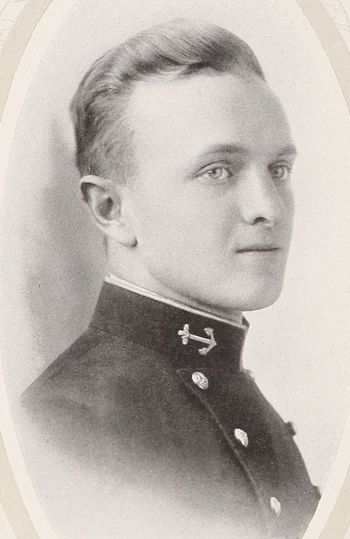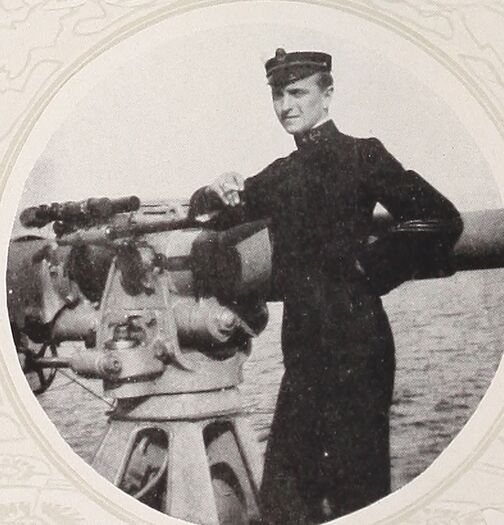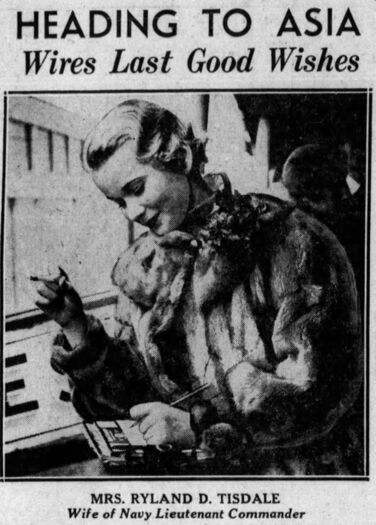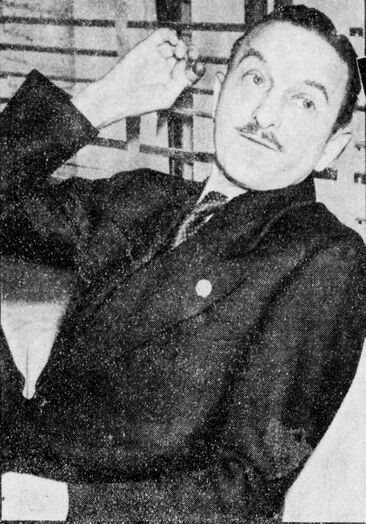RYLAND D. TISDALE, CDR, USN (RET.)
Ryland Tisdale '15
Lucky Bag
From the 1915 Lucky Bag:
Ryland Dillard Tisdale
Annapolis, Maryland
"Crab" "Gertrude" "Tizzy"
DILLARD has a queerly shaped skull filled with queerer ideas. He is a Crab and proud of it, though he hastens to inform that he wasn't born in Annapolis, you know. He can, and does, talk for hours on the subject of Maryland—or, we may as well add, on any other subject or on nothing at all; for this man makes conversation a vice, but his fluent tongue and amazing vocabulary make it a pleasing vice withal. Nobody has ever seen him rhino and he is the happiest shipmate to be found in the whole Crab Fleet. As soon as he hits the deck he starts a cheery spiel while everyone else is dumb with the blue devils. Underlying this structure of words you will find a wise discernment and an all-embracing tolerance for the foibles of others. He is as much a part of the Navy as though he were a "confidential pamphlet," he has the dope on every officer since Noah, and yet you never think of him as a Navy Junior because he's different.
Crab has read widely, and his general knowledge aided by shameless bluffing enables him to stand well with but a wee bit o' boning. He is indifferent whether or not he makes a liberty—would really prefer to sit around and smoke and read a month-old Evening Capital (it follows him everywhere)—but when he gets ashore he makes it a sterling liberty. It pains him to recall the "Take off your jerseys" episode on the Massy; he would rather tell you how he ran the Fifth Division on the Arkansas. Well, yes, Snookums did help, but not so very much.
"Oh, I love that!"
Lucky Bag Staff; Log Staff; Reina.

Ryland Dillard Tisdale
Annapolis, Maryland
"Crab" "Gertrude" "Tizzy"
DILLARD has a queerly shaped skull filled with queerer ideas. He is a Crab and proud of it, though he hastens to inform that he wasn't born in Annapolis, you know. He can, and does, talk for hours on the subject of Maryland—or, we may as well add, on any other subject or on nothing at all; for this man makes conversation a vice, but his fluent tongue and amazing vocabulary make it a pleasing vice withal. Nobody has ever seen him rhino and he is the happiest shipmate to be found in the whole Crab Fleet. As soon as he hits the deck he starts a cheery spiel while everyone else is dumb with the blue devils. Underlying this structure of words you will find a wise discernment and an all-embracing tolerance for the foibles of others. He is as much a part of the Navy as though he were a "confidential pamphlet," he has the dope on every officer since Noah, and yet you never think of him as a Navy Junior because he's different.
Crab has read widely, and his general knowledge aided by shameless bluffing enables him to stand well with but a wee bit o' boning. He is indifferent whether or not he makes a liberty—would really prefer to sit around and smoke and read a month-old Evening Capital (it follows him everywhere)—but when he gets ashore he makes it a sterling liberty. It pains him to recall the "Take off your jerseys" episode on the Massy; he would rather tell you how he ran the Fifth Division on the Arkansas. Well, yes, Snookums did help, but not so very much.
"Oh, I love that!"
Lucky Bag Staff; Log Staff; Reina.
Loss
Ryland was killed in action on May 23, 1942 at Tamparan, Lanao Province, Philippines by local forces cooperating with the Japanese.
Other Information
From Corregidor.com:
Commander Ryland D. Tisdale … began the war at Cavite and then transferred to Corregidor, but several accounts state that he escaped to Mindanao and was killed on May 23, 1942 at Tamparan in Lanao Province while fighting Moros who were collaborating with the Japanese.
Ryland was "planning and engineering officer" for the 16th Naval District, Cavite Navy Yard, Philippines, according to the Navy Directory of 1941.
From researcher Kathy Franz:
Ryland was born in Indianhead, Maryland, and often went by his middle name Dillard. He graduated from Annapolis High School in 1911. He was editor-in-chief of the monthly publication “The Red and Blue.” He also attended Werntz Preparatory School.
In October 1917 when the American transport ship Antilles was torpedoed, Ryland made a narrow escape. Per the Evening Star, July 3, 1942, Ryland was awarded the following letter of commendation for heroism on the Antilles:
“While serving on the U. S. S. Antilles when that vessel was torpedoed and sunk on October 17, 1917, he displayed coolness and courage in command of the forward guns, and delayed leaving until he was forced to dive from the bridge of the sinking vessel. He was active in assisting others to the life rafts.”
On January 21, 1918, Ryland spoke about his Antilles escape to the afternoon and evening audiences attending “moving pictures” at the Strand Theater in Hartford, Connecticut.
In June 1920 he received orders to the engineering school at the Naval Academy. In December, he bought a lot in Annapolis at 238 Prince George Street. The house was then occupied by his mother and brother James William.
On December 7, 1934, Ryland married Elizabeth Geisler in Yuma, Arizona. They immediately left for Manila as he was to be stationed in the Philippines for two years.
He was removed from active duty in March 1936, and officially retired on June 30. The couple took an around the world trip and returned to Coral Gables, Florida in July 1936.
In March 1939, Ryland applied for the harbor traffic manager’s job in San Pedro, California.
Ryland and his wife divorced in October 1940. He was recalled to active duty in December, and on January 14, 1941, he reported for duty at the Cavite base.
Ryland’s name appeared in the Western High School yearbook of 1944 under Roll of Honor.
Ryland’s father was Lt. Ryland Tisdale who graduated from the Naval Academy with the Class of 1886. Ryland’s mother Julia was a member of the D. A. R. His sisters were Julia (Mrs. Norman) and Mildred (Mrs. Larrazolo.) His brothers were George Merrick (’13) and James William. James passed the mental test for the Naval Academy but failed physically. He went to Columbia University but then joined the Canadian Army 14th B. E. F. He was wounded with shrapnel in the knee somewhere in France in September 1918. He came home in January 1919, with his leg amputated to 11 inches below the thigh.
His ex-wife, Elizabeth, was listed as next of kin. He was also survived by his mother, brother, and two sisters.
Photographs
Career
From Wikipedia:
Tisdale was trained at the Naval Ordnance Proving Ground (now the Naval Ordnance Station) located in Charles County, Maryland, about 25 miles south of Washington, D.C. He was appointed a midshipman at the U.S. Naval Academy on July 7, 1911 and graduated on June 5, 1915. Between his commissioning and the entry of the United States into World War I, Ens. Tisdale served in USS Virginia and USS Nevada.
On June 5, 1917, less than two months after the declaration of war, Tisdale reported on board USAT Antilles, apparently for duty with an armed-guard gun crew assigned to that chartered Army transport. He served in that ship until she was torpedoed off Brest, France, on October 17.
Tisdale subsequently received a special letter of commendation from the Secretary of the Navy for displaying ". . . coolness and courage in command of the forward guns, . . ." and for not leaving his post ". . . until he was forced to dive from the bridge of the sinking vessel." Tisdale also assisted other Antilles survivors onto life rafts. He was picked up by either Alcedo or Corsair and taken into Brest. On October 23, he took passage on Bridge for Great Britain, where he reported for duty to the senior United States Navy officer present. After temporary duty on Seattle, he returned to the United States on December 12.
In late January 1918, Tisdale took a three-week course of instruction at the Fuel Oil Testing Plant in Philadelphia, Pennsylvania. From there, he went to Bath, Maine, for duty in connection with the outfitting and commissioning of USS Wickes. When she was placed in commission on July 31, Lt. Tisdale became her engineering officer. From Wickes, he went to USS Lamberton as executive officer and in December 1919 moved to USS Hogan where he held the same post.
Tisdale's tour of duty in Hogan ended on June 11, 1920 when he reported to the Naval Academy for post graduate studies in engineering. A year later, he checked in at the New York Navy Yard for practical instruction during the summer, before entering Columbia University on September 28 for further course work which lasted until the early summer of 1922, when he moved to the General Electric Co. in Schenectady, New York, until the end of July. Tisdale rounded out his scholastic efforts late that summer with six weeks of study at the Westinghouse Electric and Manufacturing Co., at Pittsburgh, Pennsylvania.
Tisdale returned to sea duty in the fall of 1922. On October 16, he reported to USS Argonne in Philadelphia and, on November 8, transferred to USS California. He served in that battleship until April 1925, when he went ashore once more, this time to a billet in the Bureau of Engineering. In 1927, he completed his tour in Washington and returned to sea as executive officer of USS Bridge. On September 25, 1928, he reported for duty at Shanghai, China.
Five days later, he assumed his first command, the Asiatic Fleet destroyer Stewart. That command lasted 13 months. He was detached on October 31, 1929 and, after a month with the 16th Naval District, Lt. Comdr. Tisdale took over his second command, Palos, and began patrolling the upper reaches of the Yangtze in that gunboat. During this tour of duty, Lt. Comdr. Tisdale earned the Navy Cross. Late in July 1930, he and his ship were in the vicinity of Changsha when that city was attacked, taken, looted, and lost by Chinese communists. Tisdale and his crew assisted in the evacuation of Americans and other foreigners. He also led his crew and ship past the city for two firing passes as a show of force to discourage looting of the foreign concessions. The citation states, in part, that, ". . . the loss of American and other foreign property was limited by his timely action."
Lt. Comdr. Tisdale's next assignment took him to the Georgia School of Technology for a two-year tour of duty with the Naval Reserve Officer Training Corps detachment located there. From there, he went back to the Asiatic Fleet to join the staff of the Commander, Destroyer Squadron 5. He served in that capacity from January 19 to November 11, 1935 when he became Captain of the Yard at Olongapo in the Philippines. Tisdale was placed on the retired list on June 30, 1936, with the rank of commander.
In 1940, the United States began preparing for the contingency of war. Comdr. Tisdale returned to the colors in July and served for a brief period in the Bureau of Ships at Washington, D.C. In October, he was relieved of duty; however, within another month, he was back on active duty.
On January 14, 1941, Tisdale reported for duty at the Cavite Navy Yard near Manila in the Philippines. He served in the defense of those islands after the Japanese invasion on December 8, 1941. After the surrender at Corregidor in May 1942, Tisdale continued to resist the enemy on Mindanao. On May 23, 1942, he was killed at Tamparan in Lanao Province during action with Moros—who had collaborated with the Japanese. Comdr. Tisdale was awarded the Silver Star for his actions in the Philippines. The citation states:
The President of the United States of America takes pride in presenting the Silver Star (Posthumously) to Commander (Retired) Ryland D. Tisdale (NSN: 0-8990), United States Navy, for conspicuous gallantry and intrepidity in action in the Philippine Islands during World War II. Commander Tisdale was offered passage on the last plane to leave Corregidor when it was apparent that surrender was inevitable. Commander Tisdale refused and offered his place in the plane to Mr. Kuder who also refused. Commander Tisdale was quoted as saying that he preferred to remain and see the thing through. Mr. Kuder stated that on Thursday, April 30, 1942, the fighting in the area around Damsalan was very heavy, and that Commander Tisdale banded together a small group of officers and enlisted men, including some civilians, and threw in with Lieutenant Colonel Vesy of the Philippine Army to make a last stand against the Japanese.
From Hall of Valor:
The President of the United States of America takes pleasure in presenting the Navy Cross to Lieutenant Commander Ryland D. Tisdale (NSN: 0-8990), United States Navy, for distinguished service in the line of his profession as Commanding Officer of the U.S.S. PALOS, in handling a difficult situation in Changsha, Hunan, China between 16 July and 31 July 1930, when that city was attacked and looted by a well-organized Communist band. Through the excellent leadership, good judgment and skill of Lieutenant Commander Tisdale, all Americans and most of the foreigners were successfully evacuated and the loss of American and other foreign property was limited by his timely action.
General Orders: Bureau of Navigation Bulletin 169 (December 19, 1931)
Service: Navy
Division: U.S.S. Palos
The "Register of Commissioned and Warrant Officers of the United States Navy and Marine Corps" was published annually from 1815 through at least the 1970s; it provided rank, command or station, and occasionally billet until the beginning of World War II when command/station was no longer included. Scanned copies were reviewed and data entered from the mid-1840s through 1922, when more-frequent Navy Directories were available.
The Navy Directory was a publication that provided information on the command, billet, and rank of every active and retired naval officer. Single editions have been found online from January 1915 and March 1918, and then from three to six editions per year from 1923 through 1940; the final edition is from April 1941.
The entries in both series of documents are sometimes cryptic and confusing. They are often inconsistent, even within an edition, with the name of commands; this is especially true for aviation squadrons in the 1920s and early 1930s.
Alumni listed at the same command may or may not have had significant interactions; they could have shared a stateroom or workspace, stood many hours of watch together… or, especially at the larger commands, they might not have known each other at all. The information provides the opportunity to draw connections that are otherwise invisible, though, and gives a fuller view of the professional experiences of these alumni in Memorial Hall.
January 1916
March 1918
January 1919
January 1920
January 1921
January 1922
November 1923
January 1924
March 1924
May 1924
July 1924
September 1924
November 1924
January 1925
March 1925
May 1925
July 1925
October 1925
January 1926
October 1926
January 1927
October 1927
January 1928
April 1928
July 1928
October 1928
January 1929
April 1929
July 1929
October 1929
January 1930
April 1930
October 1930
January 1931
April 1931
July 1931
October 1931
January 1932
April 1932
October 1932
January 1933
April 1933
July 1933
LTjg Arthur Farrell '25 (Fighting Plane Squadron (VF) 5B)
LTjg Henry Twohy '29 (Fighting Plane Squadron (VF) 5B)
ENS John Yoho '29 (Scouting Plane Squadron (VS) 3B)
ENS Victor Gaulin '30 (Scouting Plane Squadron (VS) 3B)
ENS Lance Massey '30 (Scouting Plane Squadron (VS) 3B)
LTjg Charles Ostrom '30 (Scouting Plane Squadron (VS) 3B)
October 1933
LTjg Arthur Farrell '25 (Fighting Plane Squadron (VF) 5B)
LTjg Henry Twohy '29 (Fighting Plane Squadron (VF) 5B)
LTjg John Yoho '29 (Scouting Plane Squadron (VS) 3B)
ENS Victor Gaulin '30 (Scouting Plane Squadron (VS) 3B)
ENS Lance Massey '30 (Scouting Plane Squadron (VS) 3B)
LTjg Charles Ostrom '30 (Scouting Plane Squadron (VS) 3B)
April 1934
LTjg Arthur Farrell '25 (Fighting Plane Squadron (VF) 5B)
LTjg Henry Twohy '29 (Fighting Plane Squadron (VF) 5B)
LTjg John Yoho '29 (Scouting Plane Squadron (VS) 3B)
LTjg Victor Gaulin '30 (Scouting Plane Squadron (VS) 3B)
ENS Lance Massey '30 (Scouting Plane Squadron (VS) 3B)
July 1934
LTjg Walter Dey '24 (Fighting Plane Squadron (VF) 5B)
LTjg James McDonough '24 (Fighting Plane Squadron (VF) 5B)
LTjg Edwin Kelly '30 (Bombing Plane Squadron (VB) 1B)
LTjg Victor Gaulin '30 (Scouting Plane Squadron (VS) 3B)
October 1934
LTjg Walter Dey '24 (Fighting Plane Squadron (VF) 5B)
LTjg James McDonough '24 (Fighting Plane Squadron (VF) 5B)
LTjg Arthur Farrell '25 (Fighting Plane Squadron (VF) 5B)
LTjg Edwin Kelly '30 (Bombing Plane Squadron (VB) 1B)
LTjg Baylies Clark '30 (Bombing Plane Squadron (VB) 1B)
ENS Philip Ashworth '31 (Scouting Plane Squadron (VS) 3B)
LTjg Eugene Lytle, Jr. '31 (Fighting Plane Squadron (VF) 5B)
January 1935
April 1935
October 1935
January 1936
April 1936
July 1936
September 1937
January 1938
July 1938
January 1939
October 1939
June 1940
November 1940
April 1941
Namesake
USS Tisdale (DE 33) was named for Ryland; the ship was sponsored by his widow.
Memorial Hall Error
He was on the retired list; believe should this be reflected in Memorial Hall.

The "category" links below lead to lists of related Honorees; use them to explore further the service and sacrifice of alumni in Memorial Hall.


